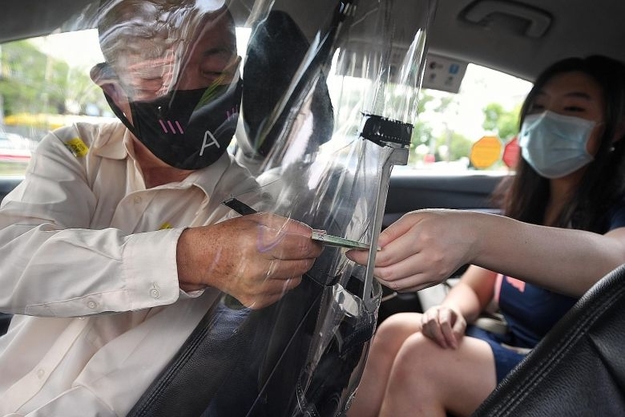Following the global outbreak of COVID-19, governments and communities have been following scientific development closely. While it was discovered that the virus is able to be transmitted through respiratory body fluids, it is not yet known whether other body fluids such as semen, breast milk, vomit, or urine may contain infectious viruses; as reported by the Centres for Disease Control and Prevention. As a response to this uncertainty, one of the lockdown measures requires sex work to be temporarily suspended. Despite reports from several organisations that regulated sex is possible, this is not reflected in the government's plan.
In the Netherlands, the government has published a road map to the relaxation of these lockdown measures. Since May 11, most contact professions were allowed to work while following precautionary safeguard measures, including driving instructors, medical professionals (dieticians, masseuses, therapists, acupuncturists, homeopaths, etc.), and workers in the beauty industry (hairdresser, beautician, nail technicians, etc.). However, sex workers are differentiated from other contact professions, and are subject to further restrictions, in which they may only resume their work activities from the soonest September 1.
This roadmap initiative has provoked protests from sex workers across the country, who feel that the singling out of sex work from other contact professions is unjustified. Natasha, for example, when interviewed by NPO Radio 1, argued that her chances of transmitting the disease in Jumbo, the supermarket, is higher than at work. She mentioned that hygiene is of a paramount concern in sex establishments, and she believed that it is possible to continue working safely. Others suggest that there are ways to resume sexual activities while maintaining a reasonable distance from each other’s faces, such as prohibiting kissing and oral sex, and sticking to sex positions such as doggy-style or reverse cow-girl.
The desire to continue working despite lockdown restrictions is partly fuelled by the lack of sufficient support given by the government. According to RTL Nieuws, in the beginning only sex work establishments are eligible to apply for government relief support schemes, not sex workers. The initial response only allows registered sex workers to apply for financial relief, whom make up a small portion of sex workers in the Netherlands. In reality, most sex workers are regarded as self-employed persons through the taxation opting-in scheme. This means that they are paying taxes for their earnings, yet are deprived from employment rights. At the moment there are schemes to help self-employed workers, yet the amount is minimal and does not allow a sustainable income. Many sex work organisations are requesting the government to provide financial relief for those under the opting-in scheme, revealing a gap in policies in which the needs of non-registered sex workers are taken out of consideration.
Although government financial relief may provide a temporary solution, the fact that many sex workers in the Netherlands are migrants requires further attention. Under Dutch immigration law, migrants that wish to request for a permanent residence permit after residing in the country for five years are non-eligible for any government benefits. This means that non-Dutch sex workers originating from other EU Member States are unlikely to request assistance since doing so might jeopardise their right to request a residence permit in the future.
It is well-documented that many sex workers continue to operate against government regulations. Of course, there are also sex workers who try to continue working through alternative means, such as using virtual platforms as in the case of webcam sex work or by offering virtual girlfriend experiences. This is not a viable alternative for most workers as the virtual sex industry is highly saturated, in which fierce competition has made it difficult for newcomers to be able to earn a living immediately.
There are some incentives being proposed as possible solutions that may allow sex workers to be back in business while abiding the safety measures endorsed by the government. On top of adopting sex positions that maintain a distance among the participants, others discuss the possibility of wearing masks and gloves at work, as currently applicable to contact professions in other industries. Alternatively, Madam Ylona Leeuwis of Rosegarden Hotel in Den Helder suggested the use of glory holes, as a possibility of allowing sexual commerce in ways that avoid any direct contact. She planned to use plastic sheets as a barrier that can be disinfected after every use, hoping that the holes in the sheets would allow penetration and cunnilingus/blowjob services back on offer.
A picture of a taxi in Singapore, source: The Straits Times - 
I spoke with Madam Meeuwis for further comments, and she expressed her frustration with regard to the wellbeing of her workers. Following the closure of her venue, it took around two months before any government assistance was available for her workers, amounting to a maximum of 600 euros. With many of her workers being migrants from Spain that have to support their families back home, she noted that this amount is not enough. As other industries have incorporated plastic sheets as barriers between customers and clients, such as in the case of taxi drivers, shops, and hospitality workers; she hopes that this would also be a possibility for sexual services. “The idea started as a joke, but if that means that I can open up, I will do it tomorrow. And I think that a lot of men would like to give it a try, if only to experience it once,” she said in the interview.
The global pandemic has revealed that some forms of workers are more vulnerable than others. At present, the categorisation of sex work as a more dangerous/risky form of contact work is problematic because it deprives sex workers from a possibility of a sustainable income. The Groningen municipality has adopted measures that encourage sex workers to do alternative work, such as working in cleaning or agriculture. Although the measure may help desperate workers in need of a quick income, it is problematic that such relief is only available by taking workers out of the sex industry. All in all, the responses to the COVID-19 outbreak have highlighted the vulnerability of sex workers. The discrimination and stigmatisation against sex work is most visible as sex workers are deprived from employment rights and social welfare benefits during these uncertain times.

